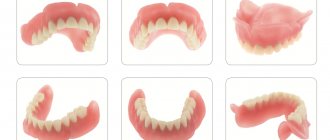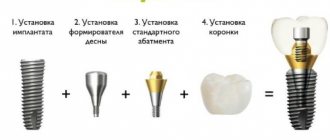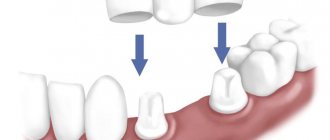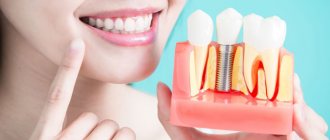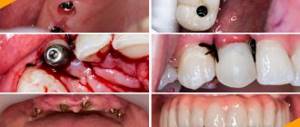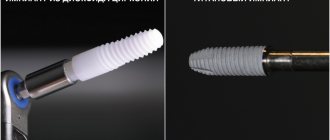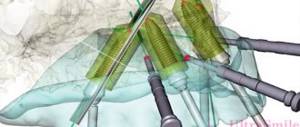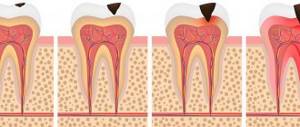How does a surgeon determine the required implant diameter?
Of course, before implantation, all patients of the German Implantology Center are examined on a high-resolution 3D tomograph, and on this tomogram all anatomical structures are clearly visible: bone density, bone volume, all its bends, where the vessels pass, where the nerves pass.
And we see all this before the operation begins, and we plan the operation based on the anatomical characteristics of a particular patient. And depending on the patient’s situation, we select the implant and offer the system that will be most suitable for the patient.
That is, an implant
is not exactly like clothing for a patient who wants to buy a certain brand
.
It does not always happen that his expectations regarding the implant model or name coincide with the model or manufacturer that the implantologist will assign to him.
If we take implants, let’s say Nobel is a very well-known company, Nobel has an excellent line - these are Parallel implants, they, in my opinion, are the best in the Nobel line. And NobelParallel’s thinnest implant has a diameter of 3.75 millimeters. And we cannot always place such an implant in anatomically limited conditions.
The same thing, if we need to replace the central lower incisor, then there is simply not enough space to install an implant with a diameter of 3.75 millimeters. And we will offer such a patient implants from Straumann. Strauman Bone Level, there is this system - a very great system, and they have an implant with a diameter of 2.9 millimeters. Moreover, these implants from Straumann are made of a special alloy patented by Roxolid
, it is very durable, a very successful implant model for just such cases.
Is it possible to combine different implant systems in one clinical case?
Of course, yes, you can combine different implant systems. And we are often approached with a similar problem by patients who were treated in other clinics; we have many patients who were treated in Europe, America, and all over the world, and we work with them. Often, when patients come to us, it happens that they have two or three different implant systems installed. And if the implants that they have are installed correctly and there are no problems, then, of course, we solve the problems based on the existing situation.
That is, those implants that the patient has, if they work normally, there is no inflammation, and they are installed in the right place, then we use them in the general concept of prosthetics. If necessary, we install our own implants further, and the entire implant system works together as a single whole.
History of the first patient
The first attempts to replace lost teeth with artificial ones were made by people in antiquity and even earlier. In the form in which we know dental implants now, they appeared in the second half of the 20th century. The first successful implantation was performed in 1965 on an ordinary carpenter, Gust Larsson, who lost all his lower teeth at the age of 34, had a cleft palate, a deformed upper jaw and chin, and experienced constant pain and significant difficulty eating and speaking. Larsson volunteered for a new study led by Professor Ingvar Brånemark at the University of Gothenburg, which Güsta had heard about by chance from his dentist. After the treatment, he was able to chew, eat and speak normally. The installed implants served Gust Larsson all his life. The experience of this brave man proved that installing dental implants is the most effective way to restore lost teeth.
Two ways
What to do? Experts offer several options. The first of them is to consciously identify new niches in the labor market.
Not everything is so sad, players of the St. Petersburg market note: with the right choice of niches in which there is an active need for personnel, you can save customers and make good money.
According to Tatyana Kharlamova, head of the Griffin Personnel agency, serious demand has emerged in the region from companies involved in clothing production.
Secure communications. What government relations specialists do Labor market
Dental implants – what are they?
Dental implants, implants, implants are all artificial structures that replace missing teeth. They are firmly fixed in the bone tissue of the jaw and serve as a reliable support for fixed or removable dentures in the form of single crowns and bridges of varying lengths (you can see what dental implants look like in the photo above). There are several types of dental implants, but the most popular today are root-shaped dental implants, which have earned favorable reviews from both patients and leading implantologists around the world. Prices for dental implants depend on their quality, features of the installation system, the presence of special coating and other factors. Which implants are better is a topic for a separate article.
Photo of a dental implant
Manufacturing companies
Which manufacturing companies offer the best products? All prostheses can be divided into three categories depending on the price range:
- premium;
- mid-price;
- low priced.
What is the difference between these types? The difference between these implants is durability and wear resistance. The higher the price, the stronger the structure. The high-price segment includes products from the following companies:
- Nobel Biocare;
- Straumann;
- Astra Tech.
Nobel Biocare products are characterized by a high degree of integration of the material into bone tissue. The rejection rate is almost zero. The approximate price for one tooth ranges from 40,000 to 70,000 rubles.
The Swiss company Straumann gives an unlimited warranty on its products. The price for one implant is about 45,000 rubles. The Swedish company Astra Tech estimates its products at around 35,000 per implant.
The average price category of prostheses is less durable in use. Products in this category are represented by the following companies:
- Dentsply Friadent;
- Zimmer;
- Schlutz Dental;
- Rusimplant;
- MIS.
A distinctive feature of Dentsply Friadent products is the invisibility of the transition boundary between the crown and the rod. The price for one prosthesis is 35,000 rubles. The cost of products from the American company Zimmer ranges from 18,000 to 30,000 rubles. The price depends on the size of the implant.
The German company Schlutz Dental produces a variety of products at prices ranging from 20,000 to 30,000 rubles per implant. In the same price range are products from the Russian company Rusimplant and the Israeli company MIS.
In the low price range (7,000 - 17,000 rubles) there are products from Ukrainian, Belarusian and Russian manufacturers.
How do dental implants take root?
What material are dental implants made of? The answer to this question will help us understand why they take root well. Almost all of the newest dental implants are made from titanium. This unique material is ideal for the manufacture of artificial tooth roots, since it is not perceived by the human body as something foreign and is not itself subject to the destructive effects of the surrounding biological environment. But the most important thing is that it can reliably fuse with the jawbone. These unique properties of titanium solved the problem of rejection and made implantation a reliable and durable technique. However, in very rare cases when a patient is allergic to titanium dental implants, zirconium dioxide is used as a base to make the prosthesis.
How long does it take for a dental implant to take root? Experts believe that the survival of dental implants is an individual process. The timing of osseointegration depends on the area of the dentition in which the implantation was performed, as well as on the quality of the bone tissue. In general, the healing of dental implants lasts from three months on the lower jaw and up to six months on the upper jaw. If the implantation is successful, then removal of the prosthesis becomes almost impossible, which proves the reliability of the structure. What is the survival rate of dental implants that worries many patients? It varies among different manufacturers, but in general it does not exceed 5%. In addition, the success of the operation is also influenced by the skill of the implant surgeon, so the choice of dentistry should be approached with special care.
Risks of implantation
The survival rate of implants today is a record 99%. But no one will ever give 100%; it is impossible to eliminate all risks. Someone will definitely fall into this 1%. Complications during implantation are very rare, but they do occur. During implantation of an artificial root, the following may happen:
- Inflammation of the tissue around the implant (peri-implantitis).
The doctor will rule out the cause of the inflammation and treat the root with special solutions. In case of relapse, the implant will have to be removed and the bone tissue will have to be restored. - Implant rejection.
It happens extremely rarely. The artificial root is removed. - The implant is unscrewed together with the plug.
This may occur during abutment placement. In the absence of inflammation, the titanium root is put in place. - The implant is pushed into the maxillary sinus.
In such cases, only removal of the titanium root will help. - Exposing the upper part of the implant.
A fairly common complication that affects aesthetics more than health.
Make an appointment
right now!
Akhmedkhanov Said Rashidovich
Surgeon, Therapist, Orthopedist, Hygienist, Implantologist
Lifespan of dental implants
Although implantation is significantly more expensive than traditional prosthetics, with a long-term calculation the costs are equalized. This is due to the fact that traditional bridges, crowns, clasp or nylon dentures need to be replaced on average every 5 to 7 years, and the supporting teeth will have to be ground down again each time. How long does a dental implant last? The minimum service life of a dental implant is about 30 years, and if all the doctor’s instructions are followed, the implant will last you a lifetime. Most manufacturing companies, including world industry leaders, who invest considerable funds in the latest developments, provide a multi-year or even lifetime warranty on their products. This applies to the part of the structure that is located inside - that is, the root (base plate, etc.) and the abutment. A crown installed on an abutment has a more limited service life, but it is also significantly longer than that of a traditional prosthesis installed on ground natural teeth. This is on average 10 – 15, sometimes 20 years. If we are talking about implantation for a young person, then, of course, he will be interested in what happens to implants in old age. With proper care and preventive examinations, nothing should happen to the artificial root.
General and specific contraindications
Who is contraindicated for dental implants? Implantation is a surgical operation and, like any other operation, it has contraindications. They are divided into two types: general for any type of implantation and specific dental ones.
The following concomitant diseases are common to all types of implantation (and to surgical interventions in general):
- violation of coagulation (blood clotting), diabetes mellitus, tuberculosis, chronic rheumatism - these diseases complicate wound healing and implant placement;
- pregnancy and lactation;
- childhood and adolescence – children and adolescents continue to grow, and this is fraught with displacement of implants or their rejection, or slowdown in the growth of individual organs as a result of the installation of dental implants in them;
- diseases of bone tissue that reduce its regenerative abilities;
- diseases of the nervous system;
- cancer during exacerbation, HIV and AIDS, specific diseases of the immune system that weaken the body as a whole and do not allow it to recover after operations.
The following can be considered specific contraindications to dental implantation:
- when installing implants in the upper jaw, it is necessary to take into account such factors as the proximity of the sinuses (aka the maxillary sinuses), as well as the width and density of the bone at the point of contact of the jaw with the sinuses; in some cases, the implantation procedure may be preceded by a sinus lift;
- chronic, including inflammatory diseases of the oral mucosa;
- patient's failure to comply with oral hygiene;
- insufficient height and density of bone tissue at the site of proposed implantation (this applies to both the upper and lower jaws) - in such a case, bone grafting can correct the situation.
It is worth noting that diabetes and advanced age are not currently included in the list of contraindications for dental implantation.
Dental implants in the upper jaw
Profession: implanter or implantologist?
An implanter, or implantologist, is a doctor who restores single teeth or a full row of them.
An implanter is sometimes confused with a prosthetist. Their functions are not the same, but are interconnected. Thanks to the implantologist, a support for bridge-type or removable prostheses is created.
Before starting work, the doctor determines a detailed treatment plan, which indicates the timing of the screw’s healing. If a person decides to seek help from an implant, then preference should be given to the method of dental restoration proposed by Dr. Dante. Its peculiarity lies in the absence of any surgical intervention: the implant is simply screwed into the canal where the molar was previously located.
Caring for Dental Implants
Many patients who have had artificial teeth installed are concerned about the question: how to care for dental implants? In fact, caring for artificial teeth is practically no different from regular oral hygiene. The same few basic rules apply here: regularity, thoroughness, correctness. That is, you need to brush your teeth at least twice a day - in the morning and before bed, and preferably after every meal, especially after eating carbohydrates; this must be done for at least three minutes, and also use additional hygiene products: dental floss, irrigator, etc.; You need to brush your teeth correctly - with sweeping movements away from the gums. The same brushes that are used for cleaning natural teeth are suitable for cleaning dental implants, but you can purchase a special toothbrush for implants.
Preparation for replantation
Before the operation, the doctor examines the patient’s oral cavity and selects the appropriate technique.
Mandatory training includes such manipulations as:
- treatment of identified dental diseases;
- cleansing tooth enamel from stones and pathogenic plaque;
- cutting off the upper part of the root;
- cleaning and filling carious cavities (if any).
After preparation and elimination of defects, the patient is sent for an x-ray. Using X-rays, the doctor assesses the quality of the filling and then begins replantation.
Important! Immediately before the procedure, you should not eat, smoke, drink alcohol or exercise, and your mouth should be clean.
Dental implants – pros and cons
As for expert opinions, the majority of specialists are inclined to argue for dental implants, and those who are usually against are either very elderly doctors or dentists who do not have sufficient qualifications to carry out such procedures. If we consider the pros and cons of dental implants, then among the undeniable advantages we can note durability, the absence of the need to grind adjacent teeth, in contrast to the installation of bridges, as well as the preservation of all the functions of a natural tooth, such as: full participation in chewing and speech, prevention of tooth loss bone tissue and changes in facial features. As for the disadvantages, the price becomes a significant difficulty for most patients, however, as mentioned above, this is an adequate cost of solving the problem once for a lifetime. As for an alternative to dental implants, it does not exist as such, since traditional prosthetics is inferior to it in all respects.
Dental implants make it possible to improve the quality of life, restore the full functionality of the dentition, restore the attractiveness of the smile, and also protect yourself from the loss of bone tissue in the place of the missing tooth, and therefore from the possibility of losing neighboring teeth. But, in any case, only an implantologist can confirm the need for this operation; he will also help you draw up a treatment plan and choose designs that suit you personally.
Make an appointment:
1. Dental clinic on the street. 50 Let Oktyabrya, 24, office 2/2: Tel 2. Dental clinic on the street. Permyakova, 73: +7 3452 51-40-47
